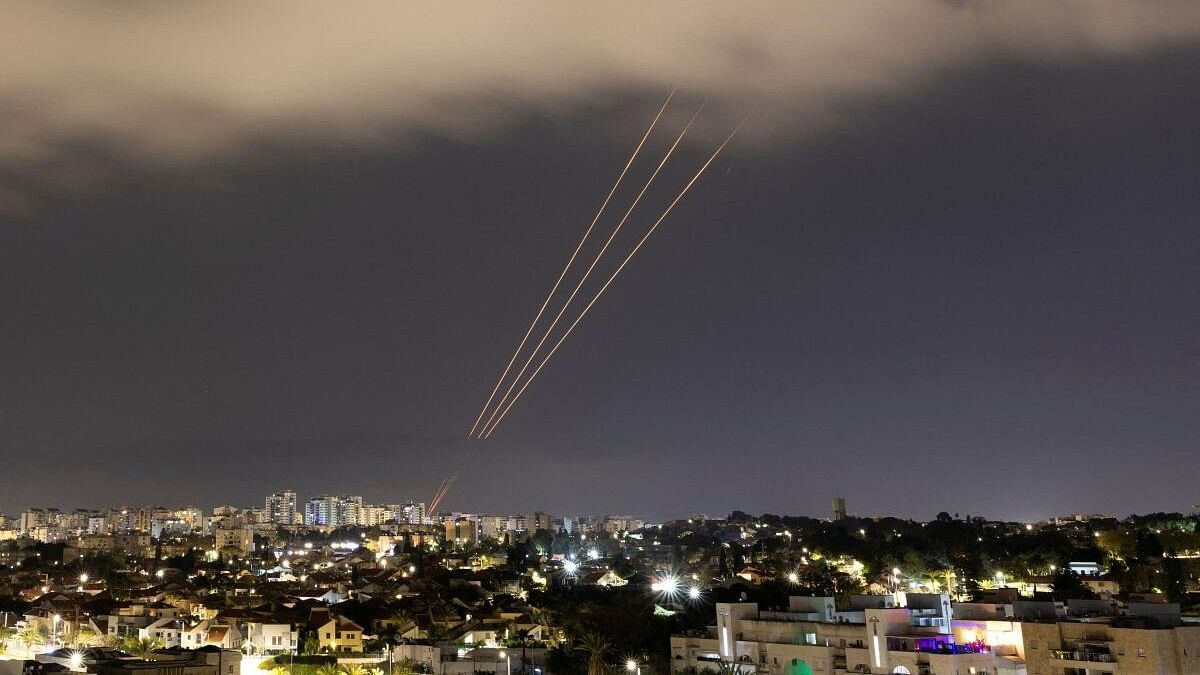
An anti-missile system operates after Iran launched drones and missiles towards Israel, as seen from Ashkelon, Israel April 14, 2024.
Credit: Reuters Photo
West Asia is teetering close to a full-scale conflagration. An apparent Israeli attack on an Iranian diplomatic compound in the Syrian capital Damascus on April 1 has triggered Iranian retaliation against Israel, the first direct military hostilities between the two countries which have fought a shadow war for decades through proxies.
Iran fired hundreds of missiles over Saturday night at Israeli targets, most of which, according to Israeli officials, were intercepted. United States President Joe Biden said he stood by the “ironclad commitment” to defend Israel against enemies. US aircraft and missile destroyers, which moved into the region over the last week, helped Israeli forces in the interception of the Iranian missiles.
Tehran had vowed to retaliate Israeli bombing in Damascus that wiped out several military commanders of the Islamic Revolutionary Guards Corps, elite military fighters of the Iranian army, including a general who was said to be Tehran’s point man for dealing with the Shia Hezbollah as well as Hamas. Israel’s Prime Minister Benjamin Netanyahu had promised to “harm whoever harms Israel”.
What the world can do without at this time, when most countries are dealing with the double whammy of post-pandemic economies, and Russia’s war in Ukraine, which has sent food and energy prices soaring, is yet another war. How Israel will respond to the escalation by Iran will depend on how much pressure the world can bring on Netanyahu to exercise restraint.
Israel’s allies in the Western world, starting with the US, have been unable to bring Netanyahu around to the idea of a ceasefire in Gaza, but they have not tried too hard either, despite the International Court of Justice ruling that the Israel Defence Forces were indulging in acts that were creating conditions for a genocide of Palestinians.
There is no doubt that the current brinkmanship is rooted in the egregious encouragement to Netanyahu by the world over Israel’s ‘right to defend’ by killing civilians in Gaza — at last count 32,000 people, mostly women — in retaliation for Hamas’ violence inside Israel that killed 1,200 people. In its impact on the region and the world, a full-scale war between Israel and Iran will make the Russia-Ukraine war seem like small potatoes. If Netanyahu is beyond listening to reason, it is fair for the world to demand that he be replaced.
Pro-Israel India immediately finds its hands full. It must talk to Iran to free 17 Indian workers on board an Israeli ship boarded by the IRGC in the Persian Gulf on Sunday. Delhi’s travel advisory asking Indians to avoid travel to Iran and Israel begs the question if the government was not foolhardy in responding to Netanyahu’s call for Indians to replace the Palestinian workforce in that country — a decision hailed widely as India’s assistance to Israel in its war effort against “Muslim terrorists”. Whatever the government’s predilections, it must desist from schemes that thrust Indians into risky situations.